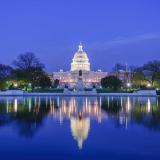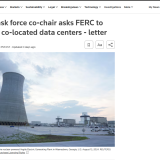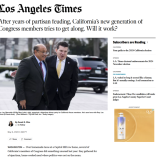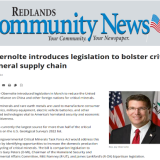In the News
WASHINGTON – This week, Congressman David Valadao (CA-22) led the entire California Republican delegation in urging Governor Gavin Newsom to suspend the state’s upcoming gas tax increase on July 1, 2025.
Today, Congressional Western Caucus Chairman Doug LaMalfa (CA-01) and Vice Chair Jay Obernolte (CA-23) celebrated President Donald Trump’s signing of three Congressional Review Act (CRA) resolutions to overturn California’s de facto electric vehicle (EV) mandates. Specifically, the resolutions overturn the Biden administration’s approval of California’s vehicle emissions mandates, including the Advanced Clean Cars II regulation, the Advanced Clean Trucks regulation, and the Omnibus Low-NOx Emissions rule.
WASHINGTON – Senate Judiciary Committee Chair Chuck Grassley (R-Iowa) introduced the Artificial Intelligence (AI) Whistleblower Protection Act to provide explicit whistleblower protections to those developing and deploying AI. Currently, AI companies’ restrictive severance and nondisclosure agreements (NDAs) create a chilling effect on current and former employees looking to make whistleblower disclosures to the federal government, including Congress.
A co-chair of the U.S. Congressional artificial intelligence task force urged federal energy regulators this week to support the development of data centers directly connected to power plants, citing national security and competition for global AI dominance, according to a letter seen by Reuters dated Dec. 5.
Over homemade tacos at a Capitol Hill row home, several of California’s members of Congress did something unusual last year: they gathered for a bipartisan, home-cooked meal where politics were not on the menu.
The table full of Republicans and Democrats represented an opening salvo in a push by some of the state’s newest representatives to build collegiality and cross party work in a place that in recent years has supported neither.
Rep. Jay Obernolte introduced legislation in March to reduce the United States’ reliance on China and other foreign nations for critical minerals.
Critical minerals and rare earth metals are used to manufacture consumer electronics, military equipment, electric vehicle batteries, and other advanced technologies vital to America’s homeland security and economic competitiveness.
California's state government, under the leadership of Democratic Gov. Gavin Newsom, is pursuing a wide-ranging climate agenda targeting the transportation sector — actions that could have major economic implications.
Jay Obernolte was a seventh grader when his father came home with a transformative gift: an Apple II Plus computer and a book on how to learn to program.
It didn’t have a disk drive or cassette interface — those were expensive, he recalled — which meant nothing could be saved. Any program he had learned to write had to be retyped when he turned the computer on, starting from scratch.
...
Read more here.
As artificial intelligence gets more sophisticated, federal policymakers have to reckon with what that means for national security.
With AI, the weapon can also be the shield. We examine how the U.S. is embracing AI as a tool to bolster its cyber defenses and what Congress is doing on the issue.
...Rep. Jay Obernolte (R-Calif.) is the chair of the House’s AI task force. He’s also the only member of Congress with a master’s degree in AI and is playing a leading role in developing cybersecurity policy.










